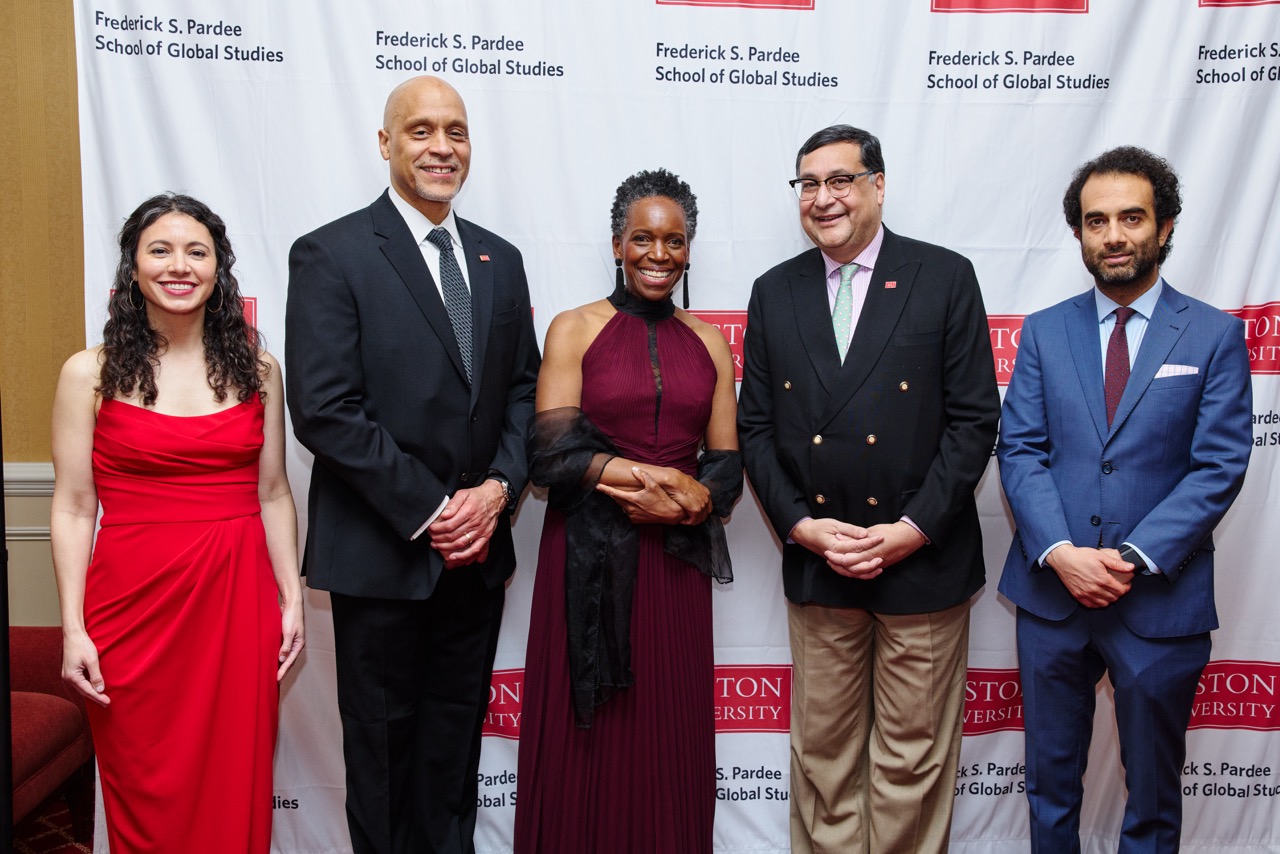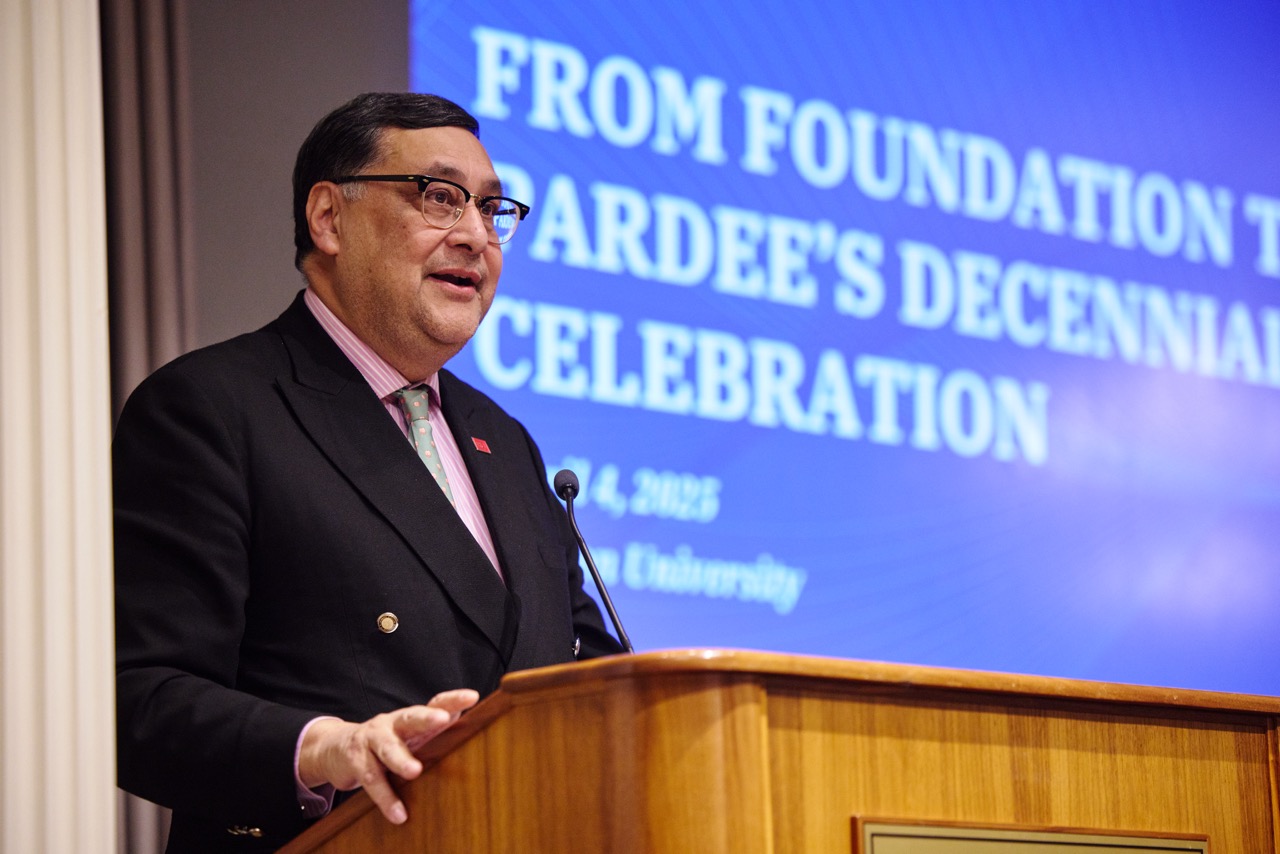Celebrating a Decade of Global Impact

Boston University’s Frederick S. Pardee School of Global Studies marked its 10th anniversary on April 4, 2025, with a day of panels, discussions, and a gala dinner that brought together faculty, alumni, students, and distinguished guests to reflect on the school’s first decade and envision its future.
The celebration, generously sponsored by the Slater Family Foundation through Trustee Kenneth Slater—a member of the Pardee Dean’s Advisory Board—featured morning panels on “Boston in the World” and “Advancing Human Progress through Peacebuilding and Development,” followed by a luncheon address and an evening gala. Slater, who oversees acquisitions for Slater Family Holdings and has over 35 years of experience in investment securities and real estate, has endowed Chairs and Lecture Series at BU and other institutions alongside his family.
A Vision Realized
What began in 2013 with a transformative $25 million gift from Frederick S. Pardee (Questrom’54,’54, Hon.’06) has grown into one of the nation’s premier institutions for international affairs education and research. The 10-year milestone arrives as Pardee plans a new 12-story home on Bay State Road and continues addressing urgent global challenges with its hallmark interdisciplinary approach.
“Fred Pardee described himself as a ‘dreamer of the future,’ and we are proud to carry his name and vision forward to help build the positive future to which he dedicated his philanthropy,” said BU President Melissa Gilliam during the celebration.
From Department to Global Powerhouse
Though officially launched in 2014, the Pardee School’s foundation stretches back decades. The African Studies Center, established in 1952, was the first of what would become a network of regional and thematic centers central to Pardee’s identity.
In 1999, then-International Relations faculty member William Grimes, alongside colleagues Andrew Bacevich and Strom Thacker, developed a strategic plan that would later inform the school’s structure. Grimes recalled that their vision emphasized “interdisciplinary, problem-oriented research and teaching; a full integration of practitioners into all aspects of the school and its research and teaching missions; and a doubling-down on the importance of regional studies at a time when many social sciences were devaluing regional knowledge.”
While funding didn’t materialize at the time, those ideas resurfaced in 2012, when then-CAS Dean Virginia Sapiro consulted with Grimes—by then chair of the IR Department—about a proposed gift from Fred Pardee.
“I pushed strongly for the model that finally prevailed: a strong, cohesive faculty and academic programs, while trying to effectively incorporate the centers and nurture connections across the university,” Grimes said.
That vision came to life in 2013 through Pardee’s gift and collaboration with then-President Robert Brown. Adil Najam was named inaugural dean, tasked with unifying the various centers and setting the school’s direction. In fall 2013, a committee developed the school’s first mission statement and designed its initial administrative structure, with Najam playing a key role in crafting the mission.
Honoring a Legacy of Leadership
The gala included the presentation of the inaugural Dean’s International Leadership Award to Dr. Adil Najam, recognizing his leadership as founding dean from 2014 to 2022.
“I am thrilled to award the first Dean’s International Leadership Award to Dr. Adil Najam,” said Dean Taylor in his presentation speech. “The success we celebrate tonight would not be possible without his foundational leadership, which included no small amount of institutional alchemy in melding disparate components into a true school and community.”

Najam, now President of WWF International and Dean Emeritus at Pardee, previously contributed to the IPCC’s Nobel Peace Prize-winning work and has received two of Pakistan’s highest civil awards: the Sitara-i-Imtiaz (2010) and the Hilal-i-Imtiaz (2023).
Reflecting on the milestone and the recognition, Najam shared his emotions: “To have been entrusted to serve as the Inaugural Dean of the Pardee School was one of the great privileges of my career. Was already giddy at the School reaching this important milestone. Now deeply touched to be awarded the School’s first International Leadership Award at the Decennial Gala. Honored and humbled. Thank you, BU Pardee School…. Here is looking to the 25th, the 50th, and beyond!”
A Decade of Growth and Impact
In just 10 years, Pardee has grown to serve approximately 700 undergraduate and graduate students with five undergraduate majors, six master’s programs, and eight research centers. The school now includes 40 faculty and joined the Association of Professional Schools of International Affairs (APSIA) in 2023.
“Pardee has gone from department to school and shaped a new identity, personality, and institutional distinctiveness—on campus and far beyond,” said Dean Taylor.
Taylor became the school’s second dean in 2022, bringing deep expertise in African politics and political economy. A Professor of International Relations specializing in business-state relations, governance, and political reform, Taylor previously served as Vice Dean for Diversity, Equity and Inclusion at Georgetown’s School of Foreign Service and has consulted for organizations including USAID and the World Bank. As a life member of the Council on Foreign Relations and member of the Board of Directors of the National Endowment for Democracy, Taylor continues to steer the school through its next phase of development.
A Moment for Global Leadership
The day’s keynote speaker was Carrie Hessler-Radelet (CAS’79, Hon.’16), former Peace Corps director and current CEO of Global Communities. Speaking on “Showing Up in Hope and Leadership for the Work that Endures,” she addressed urgent challenges in international development.
“Without question, the last few months have tested us deeply,” she said. “Development and humanitarian programs have ended abruptly, and this country’s commitment to soft power and the three Ds—development, diplomacy, and defense, working together in concert—is in peril. Longstanding global partnerships between our nation and others are strained and, in some cases, broken.”
Her organization has lost most USAID funding and exited dozens of countries, yet she framed this moment as an opportunity for necessary change: “For too long, development was designed from the outside in—by donors or implementers far removed from the communities they aim to serve. But today’s disruption is calling us to listen more closely, to act more inclusively.”
Hessler-Radelet emphasized that effective development must be locally-led: “Local leaders bring knowledge born of lived experience, cultural context, and long-term commitment that external actors, no matter how good they are, just cannot replicate.” Her message reinforced Pardee’s mission of “peace that lasts, development that works, and knowledge that transforms.”

A Student’s Perspective
For students, the celebration was both personal and powerful.
“Both the conference and the gala dinner left me inspired,” said Faizaan Firoz (BA IR ’25). “It was emotional seeing all the faculty and advisors who’ve been so instrumental in my journey and the journeys of so many others. I was reminded of all the hard work we’ve done—and how much there is still yet to do. I came away re-energized and of the belief that international affairs, and human well-being, are more important than ever before.”
Firoz also reflected on the impact of seeing his mentor, Adil Najam, honored during the gala. “He reminded us of the importance of being on the side of the angels—and the responsibility we all have to work for the betterment of our communities,” he said.
Looking Forward: A New Home for Pardee
As Pardee enters its second decade, a bold new chapter begins with plans for a $118 million, 12-story building at 250 Bay State Road. Once completed, it will be the largest mass timber tower on the East Coast, fully electric, and feature green space linking the BU Beach to the Tsai Performance Center.
“The building will become a convening space, a gathering space, a talked-about space in a way that benefits not just Pardee, but also, I think, BU as a whole,” Taylor said. Construction is slated to begin in 2026 with completion by 2028.
The environmentally friendly design will include triple-glazed glass, space for solar panels, and will be built using timber instead of concrete and steel, reducing the building’s embodied carbon footprint by 87 percent.
Building on a Strong Foundation
The celebration also honored longtime faculty contributions, including those of Professor William Grimes, who served as Pardee’s first Associate Dean for Academic Affairs for seven years.
“Bill did an amazing job,” said Elaine Bidianos, Senior Manager of Academic Affairs. “In particular, I will never forget his round-the-clock, incredible work when we had to quickly pivot to remote teaching during COVID. He worked tirelessly with faculty, jumping on calls, attending their classes, coming up with teaching strategies, whatever it took to support them as we navigated those crazy times.”
Grimes reflected on the school’s evolution: “Over the last ten years, the administration and faculty have acted strategically to build the faculty, curriculum, ethos, and public profile of the school. We’ve been guided by the same principles that have been in place since I arrived in 1996 – interdisciplinary, problem-oriented research and teaching; integration of theoretical and regional knowledge; and incorporation of practitioners into everything we do.”

He noted expanded global coverage and increased visibility thanks to centers like the Global Development Policy Center and the global prominence of faculty such as Najam and Amb. Jorge Heine.
To mark the milestone, the school released a special 10-year anniversary video featuring interviews with faculty, alumni, and students—a visual testament to its journey.
Looking Ahead
In closing remarks at the gala, Taylor acknowledged the challenges facing higher education and international affairs:
“This is a difficult time for higher education in the United States and for international affairs. Many of us who have devoted our careers to trying to better understand the world we share and—to echo Fred Pardee—advance human progress, feel unmoored.”
Yet he emphasized that progress “has never been inexorable: We progress in fits and starts.” In the face of current challenges, Taylor reaffirmed the school’s commitment to its purpose:
“This moment was made for a school of global affairs. Addressing the challenges of THIS TIME. This is where we shine. This is where we impact policy. This is where we are called, as a community of scholars, practitioners and alumni, to solve problems. This—this confusing, disruptive, disorienting moment—demands our response. And in responding, we move closer to realizing Fred Pardee’s vision.”